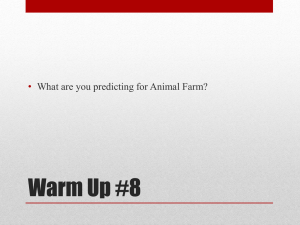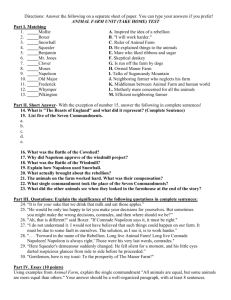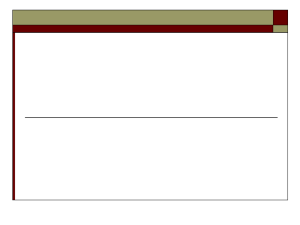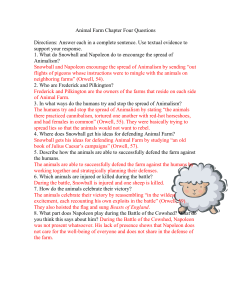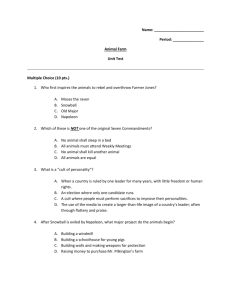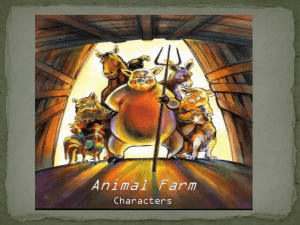Animal Farm Quiz
advertisement
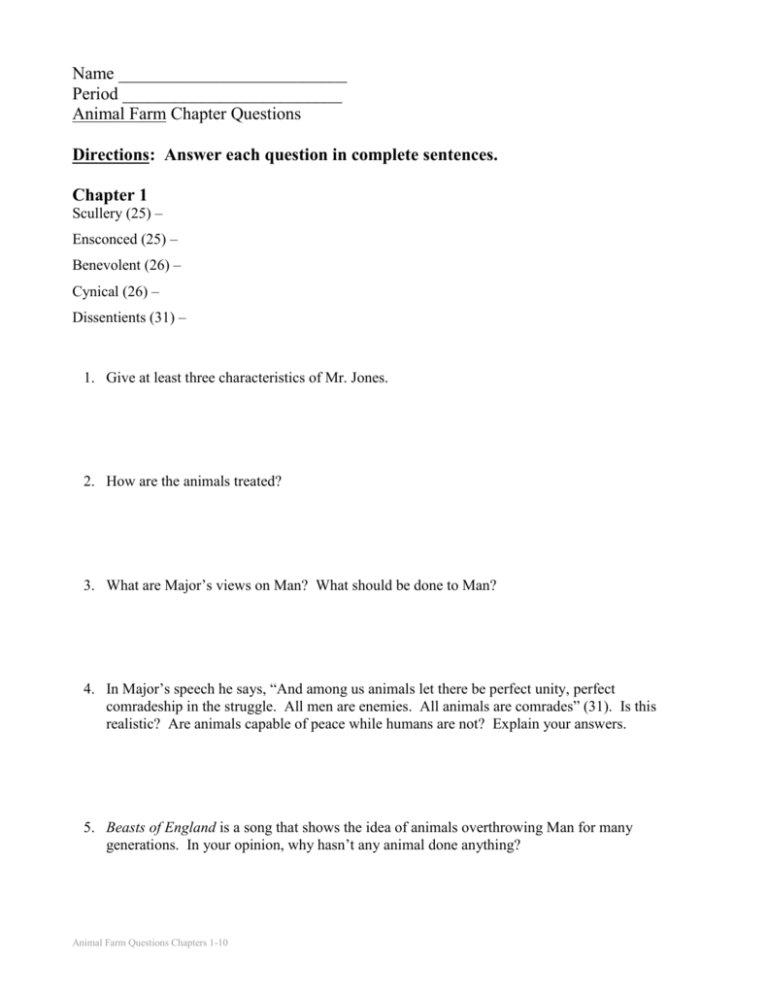
Name __________________________ Period _________________________ Animal Farm Chapter Questions Directions: Answer each question in complete sentences. Chapter 1 Scullery (25) – Ensconced (25) – Benevolent (26) – Cynical (26) – Dissentients (31) – 1. Give at least three characteristics of Mr. Jones. 2. How are the animals treated? 3. What are Major’s views on Man? What should be done to Man? 4. In Major’s speech he says, “And among us animals let there be perfect unity, perfect comradeship in the struggle. All men are enemies. All animals are comrades” (31). Is this realistic? Are animals capable of peace while humans are not? Explain your answers. 5. Beasts of England is a song that shows the idea of animals overthrowing Man for many generations. In your opinion, why hasn’t any animal done anything? Animal Farm Questions Chapters 1-10 Chapter 2 Pre-eminent (35) – Elaborate (d) (36) – Expound (ed) (36) – Apathy (36) – Gambol(led) (40) – Lithograph (41) – 1. What is Animalism and who are the leaders? 2. Describe how Mr. Jones has been acting lately. 3. Describe the events surrounding the Rebellion. 4. After the animals overtook the farm, what did they do first? 5. Describe Mollie’s actions after Mr. Jones left? Why did the others disapprove of her actions? 6. Why did the animals feel like they needed the “Seven Commandments?” 7. List the Seven Commandments. Animal Farm Questions Chapters 1-10 Chapter 3 Cryptic (47) – Indefatigable (49) – Maxim (50) 1. Why don’t the pigs do any work? Do you think this will be a problem? Explain your answer. 2. Do the animals work as efficiently as Jones and his men did? 3. Describe what the animals do on Sundays. 4. What are the learning capabilities of the different types of animals? 5. Why do the pigs get to eat the milk and apples? Chapter 4 Tractable (56) – Ignominious (58) – Impromptu (59) – 1. What has happened to Mr. Jones after the Rebellion? 2. Compare and contrast the two farms, Foxwood and Pinchfield and their owners. Animal Farm Questions Chapters 1-10 3. How do the animals win the Battle of the Cowshed? Give specific details. 4. Describe how the neighboring people perceive Animal Farm. Chapter 5 Blithely (61) – Manifestly (62) – Conjured (64) – Disinterred (70) – Ratify (ied) – 1. Describe Mollie’s recent actions and also her interaction with one of Mr. Pilkington’s men. 2. In detail, describe Snowball’s plans for the windmill. How will it be used? 3. What is Napoleon’s opinion of the windmill? 4. Who chased Snowball out of Animal Farm? 5. How and why was Snowball chased out of Animal Farm? 6. According to Squealer, what characteristics did Snowball lack? Animal Farm Questions Chapters 1-10 7. At the end of the chapter, how does Napoleon feel about building the windmill? Why did he change his mind? Chapter 6 Cockerel (75) – Arable (75) – Malignity (82) – 1. Describe the life of the animals at this point in the novel. 2. Why did Napoleon decide to participate in trade? What will he trade? 3. Who is Mr. Whymper and what is his job? 4. How have Squealer and the others defended trading with humans and allowing the pigs to sleep in beds? 5. Who does Napoleon blame for the destruction of the windmill? Animal Farm Questions Chapters 1-10 Chapter 7 Pretext (85) – Edible (85) – Capitulated (87) – Graphically (91) – Countenance (92) – 1. The animals’ lives have changed for the worse. Describe their current condition on the farm. 2. What do the animals believe about Snowball’s recent behavior and past motivations? 3. Napoleon orders his dogs to kill animals that have been stirring up trouble. What were the animals’ crimes? Explain if they deserved to die. 4. When Napoleon decided to sell the hens’ eggs, what did the hens do? 5. On page 95 Clover remembers Major’s speech and his predications of the future. What has not come true? 6. Why does Napoleon not allow the animals to sing Beasts of England anymore? Animal Farm Questions Chapters 1-10 Chapter 8 Censured (103) – Demeanor – 1. How and why was the Sixth Commandment of “no animal shall kill any other animal” altered? 2. Minimus comes up with the poem Comrade Napoleon to replace Beasts of England. Does the poem speak truthfully of Napoleon? Describe your answer. 3. What do the animals think about Mr. Frederick and Mr. Pilkington? 4. List the lies that are told about Snowball to the other animals. 5. What happened to the negotiations between Napoleon and Mr. Frederick? 6. Describe the events surrounding the Battle of the Windmill. Does Pilkington help? 7. Do you think they won the battle? Why or why not? 8. In pages 111-113, describe Napoleon’s actions. Animal Farm Questions Chapters 1-10 Chapter 9 Superannuated (115) – Precincts (118) – 1. At the beginning of the chapter, what state is Boxer in? 2. Why does Napoleon educate the pigs? 3. Describe the events of the Spontaneous Demonstration. 4. How does Napoleon benefit from Boxer’s ill condition? Chapter 10 Taciturn (127) – Morose (127) – Frugally (128) – 1. Compare and contrast the condition of Manor Farm and Animal Farm. 2. Describe the work ethic of the pigs and dogs. 3. Describe the appetites of the pigs and dogs. Animal Farm Questions Chapters 1-10 4. Explain, in detail, how the pigs (especially Napoleon) have become more like humans than farm animals. List at least 4 examples. Examples can be found on pages 132-134. 5. Benjamin noticed that the Seven Commandments were erased from the wall and were replaced by a single maxim. What is the maxim? Explain how it fits into the context of the rest of the novel. 6. What will Napoleon suppress? 7. Why were humans invited to Animal Farm? 8. Describe Mr. Pilkington’s speech. 9. Why does Napoleon change the name of the farm back to Manor Farm? 10. React to this quote: “The creatures outside looked from pig to man, and from man to pig, and from pig to man again; but already it was impossible to say which was which: (139). Did you predict that this would happen? Why or why not? Animal Farm Questions Chapters 1-10 Literary Terms in Animal Farm Directions: Find examples of each literary term in the novel Animal Farm. Make sure you record the page numbers for your examples. Personification – giving human qualities to nonhuman things, such as animals, aspects of nature, or even ideas A) B) C) D) Foreshadowing – use of hints or clues that suggest the outcome of a story A) B) C) Irony – In irony of situation an event occurs that directly contradicts the expectations of the reader or the audience. It is also figurative language in which the intended meaning differs from the literal meaning. Example: It is ironic that the pigs are the ones who come up with the Seven Commandments but are also the ones that do not obey them. A) B) Animal Farm Questions Chapters 1-10 Allusion – a reference in a literary work to something outside the work. The reference is usually to some famous person, event, or other literary work. *It would be helpful to use the article “The Russian Revolutionaries.” A) B) C) D) E) Other terms you should be familiar with: Allegory: A story with more than one level of meaning – a literal level and one or more symbolic levels. It allows a writer to tell a story about literal characters and to make a moral, religious, or political point. Satire: A type of writing that ridicules or criticizes the faults of individuals or groups. Although a satire may be humorous, its purpose is not simply to make readers laugh but to correct the flaws and shortcomings it points out. Beast fable: A story, usually with animal characters, that teaches a lesson or moral. In a few sentences, describe how Animal Farm is an allegory, a satire, and also a beast fable. Animal Farm Questions Chapters 1-10
